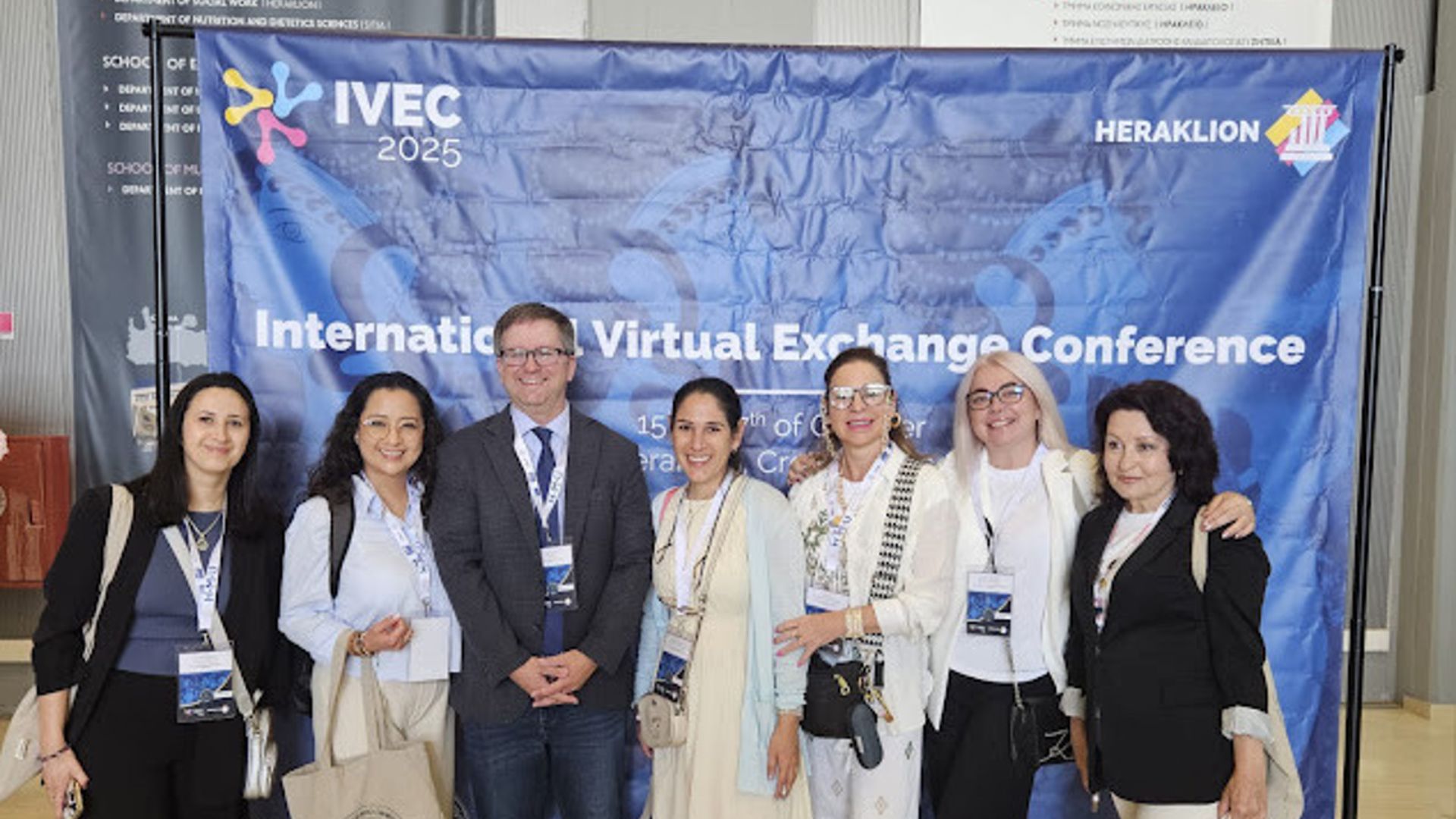Indianapolis, Indiana – When Ivy Tech set out several years ago to expand its global learning footprint, the college imagined virtual exchanges as a bridge—a way for students in Indiana to step into conversations with peers around the world. That bridge grew even stronger this past October when an Ivy Tech representative traveled to Heraklion, Crete, to participate in the International Virtual Exchange Conference (IVEC), the world’s leading gathering dedicated exclusively to the power of technology-enabled global classrooms.
Held in the historic port city on the island of Crete, the conference brought faculty, administrators, researchers, and innovators together for a weeklong deep dive into how international virtual exchanges are shaping modern education. For Ivy Tech’s representative, attending the event was made possible by a scholarship from the Hellenic Mediterranean University—the conference’s host—and through support from the Ivy Tech Indianapolis School of Arts, Sciences, and Education Professional Development Committee.
The experience was not only meaningful but also eye-opening. Throughout the week, participants explored how virtual exchanges allow students to collaborate across borders through tools as simple and familiar as Zoom. Researchers from the American Association of Colleges and Universities (AAC&U) highlighted how these interactions are considered a high-impact practice, offering transformative learning opportunities that develop real-world skills. As the global workforce becomes increasingly interconnected, the importance of these exchanges continues to grow.
Connecting with educators from across the world was one of the most striking parts of the conference. Representatives from U.S. institutions—including community colleges from the Alamo District, as well as faculty from Indiana University and Ball State University—joined discussions about the shared challenges of global education and the innovations reshaping the field. Conversations revolved around language barriers, time-zone differences, mental health concerns, and the technical hurdles that shape distance-based collaboration.
For Ivy Tech, virtual exchanges are not a new endeavor. For more than three years, the college has been developing and expanding international partnerships that give students direct interaction with peers in Chile, Germany, South Africa, Spain, and Uzbekistan, among other nations. These collaborations introduce students to different cultural perspectives and push them to navigate real-time teamwork across borders. The result is a generation of learners better prepared for roles in global industries—students who can communicate effectively with diverse colleagues, adapt to different work cultures, and problem-solve with teams spread across continents.
A particularly memorable moment during the conference came through a long-awaited face-to-face meeting with Dr. Lyudmila Kruhlenko, an international collaborator who has been working with Ivy Tech faculty for two years. Kruhlenko is affiliated with the University of Bamberg in Germany and Pryazovskyi State University in Ukraine—a university displaced from Mariupol due to the Russian occupation. What began as a simple online professional connection grew into a meaningful partnership grounded in shared commitment to supporting students during difficult times.
The relationship deepened when Kruhlenko was invited to speak at a LEAP Indiana statewide Trauma-Informed Teaching and Learning Community event. Her insights, drawn from her experience supporting students in the midst of war, resonated profoundly with educators who were grappling with increasing mental health challenges among students in Indiana. She also appeared as a featured speaker at Ivy Tech’s 2024 Communities of Care Virtual Symposium, where she again offered powerful reflections on how educators can uphold compassion and stability in moments of crisis.
During the height of the pandemic and beyond, LEAP Indiana had been examining how stress and anxiety were affecting student performance and well-being. Faculty sought ways to support students holistically—not only academically but also emotionally. Kruhlenko’s perspective, shaped by teaching during active conflict, brought a rare level of clarity to those conversations.
The collaboration grew even stronger this semester when work began on a virtual exchange project for English 111 students. One recent session became unexpectedly emotional when Kruhlenko’s students in Dnipro were forced to take shelter during drone strikes. “One of her students, Andrii, shared his experience and even showed videos of damage just a block away,” the Ivy Tech representative noted. The moment served as a stark reminder of the resilience of students who continue to learn, reflect, and participate despite conditions that no student should ever have to face.
Meeting Kruhlenko in person at IVEC felt like a milestone after years of working together online. The students at Ivy Tech expressed excitement hearing about the meeting—proof that global learning becomes even more meaningful when real relationships form behind the lessons.
Beyond this partnership, the conference provided a wealth of resources, case studies, and conversations with innovators advancing virtual exchange around the globe. Leaders from regions such as Japan and South America showcased how they are using technology to build international collaboration into college curricula. Workshops covered everything from assessment techniques to emerging technologies that support cross-cultural communication.
The trip also allowed for a reunion with Dr. Konstantinos Petridis, a Fulbright Scholar and dedicated global education advocate. The two had previously met at the NAFSA: Association of Educators conference in San Diego over the summer, where Ivy Tech’s Dr. Carmen Paniagua co-presented. Reconnecting at IVEC provided another opportunity to share ideas about building sustainable international partnerships that benefit community college students—a demographic often overlooked in global learning discussions.
As Ivy Tech continues to strengthen its global engagement efforts, opportunities like IVEC help broaden the college’s vision. They reinforce the idea that international learning does not always require passports or expensive travel; sometimes it simply requires a laptop, a strong partner abroad, and the willingness to learn from one another.
For educators interested in bringing global collaboration into their own classrooms, Ivy Tech encourages reaching out for support. As the representative noted: “For those interested in learning more about global learning opportunities, including international virtual exchanges and partnering your classrooms with educators from around the world, feel free to reach out to Prof. Gerald Maki at [email protected].”
With new connections formed, ongoing partnerships strengthened, and a refreshed commitment to global education, Ivy Tech returns from Greece with a clear message: the world is closer than ever—and classrooms can be, too.














